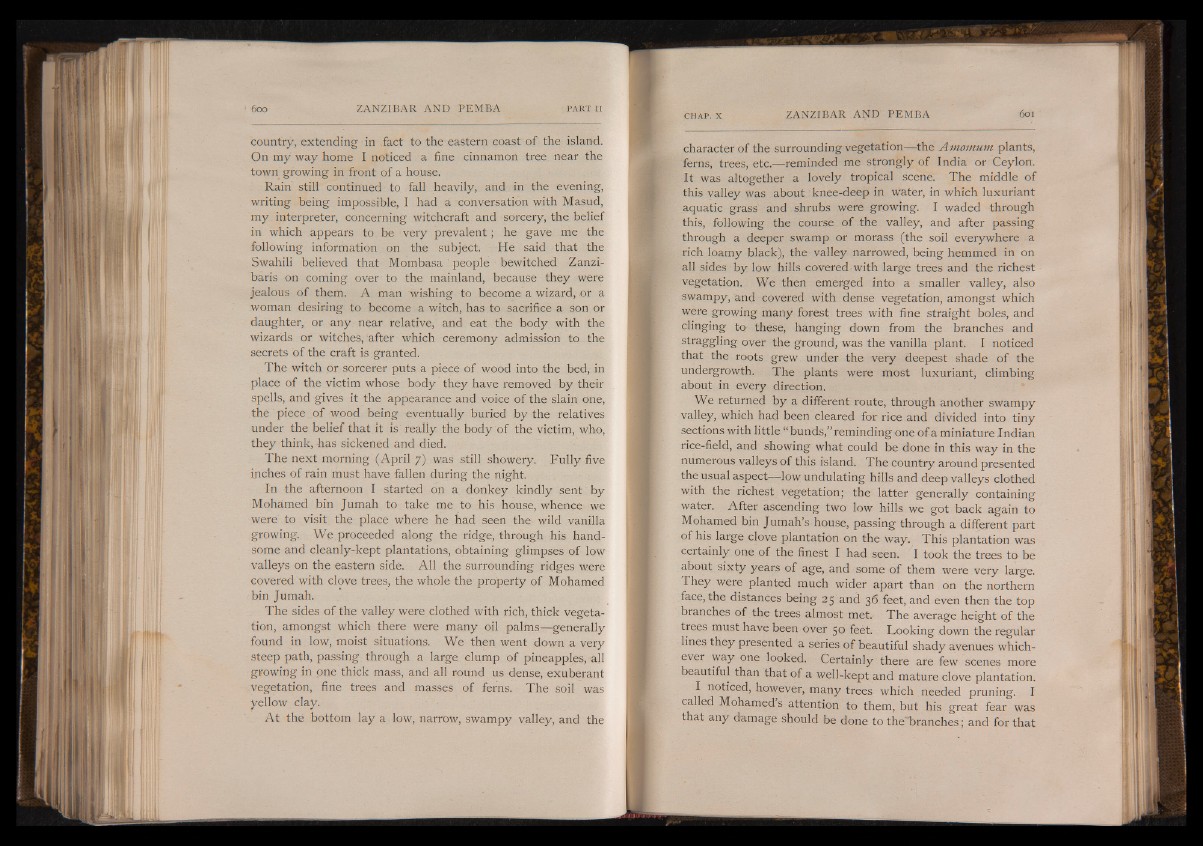
country, extending in fact to the eastern coast'of the island.
On my way home I noticed a fine cinnamon tree near the
town growing in front of a house.
Rain still continued to fall heavily, and in the evening,
writing being impossible, I had a conversation with Masud,
my interpreter, concerning witchcraft and sorcery, the belief
in which appears to be very prevalent ; he gave me the
following information on the subject. He said that the
Swahili believed that Mombasapeople bewitched Zanzibaris
on coming over to the mainland, because they were
jealous of them. A man wishing to become a wizard, -or a
woman desiring to become a witch, has to sacrifice a son or
daughter, or any near relative, and eat the body with the
wizards or witches, after which ceremony admission to the
secrets of the craft is granted.
The witch or sorcerer puts a piece of wood into the bed, in
place of the victim whose body they have removed by their
spells, and gives it the appearance and voice of the slain one,
thè piece of wood being eventually buried by the relatives
under the belief that it is really the body of the victim, who,
they think, has sickened and died.
The next morning (April 7) was still showery. Fully five
inches of rain must have fallen during the night.
In the afternoon I started on a donkey kindly sent by
Mohamed bin Jumah to take me to his house, whence we
were to visit the place where he had seen the wild vanilla
growing. We proceeded along the ridge, through his handsome
and cleanly-kept plantations, obtaining glimpses of low
valleys on the eastern side. All the surrounding ridges were
covered with clove trees, the whole the property of Mohamed
bin Jumah.
The sides of the valley were clothed with rich, thick vegetation,
amongst which there were many oil palms— generally
found in low, moist situations. We then went down a very
steep path, passing through a large clump of pineapples, all
growing in one thick mass, and all round us dense, exuberant
vegetation, fine trees and masses of ferns. The soil was
yellow clay.
A t the bottom lay a low, narrow, swampy valley, and the
character of the surrounding vegetation— the Amomum plants,
ferns, trees, etc.— reminded me strongly of India or Ceylon.
It was altogether a lovely tropical scene. The middle of
this valley was about knee-deep in water, in which luxuriant
aquatic grass and shrubs were growing. I waded through
this, following the course of the valley, and after passing
through a deeper swamp or morass (the soil everywhere a
rich loamy black), the valley narrowed, being hemmed in on
all sides by low hills covered with large trees and the richest
vegetation. We then emerged into a smaller valley, also
swampy, and covered with dense vegetation, amongst which
were growing many forest trees with fine straight boles, and
clinging to these, hanging down from the branches and
straggling over the ground, was the vanilla plant. I noticed
that the roots grew under the very deepest shade of the
undergrowth. The plants were most luxuriant, climbing
about in every direction.
We returned by a different route, through another swampy
valley, which had been cleared for rice and divided into tiny
sections with little “ bunds,” reminding one of a miniature Indian
rice-field, and showing what could be done in this way in the
numerous valleys of this island. The country around presented
the usual aspect—-low undulating hills and deep valleys clothed
with the richest vegetation; the latter generally containing
water. After ascending two low hills we got back again to
Mohamed bin Jumah’s house, passing through a different part
of his large clove plantation on the way. This plantation was
certainly one of the finest I had seen. I took the trees to be
about sixty years of age, and some of them were very large.
They were planted much wider apart than on the northern
face, the distances being 25 and 36 feet, and even then the top
branches of the trees almost met. The average height of the
trees must have been over 50 feet. Looking down the regular
lines they presented a series of beautiful shady avenues whichever
way one looked. Certainly there are few scenes more
beautiful than that of a well-kept and mature clove plantation.
I noticed, however, many trees which needed pruning. I
called Mohamed’s attention to them, but his great fear was
that any damage should be done to the~branches; and for that